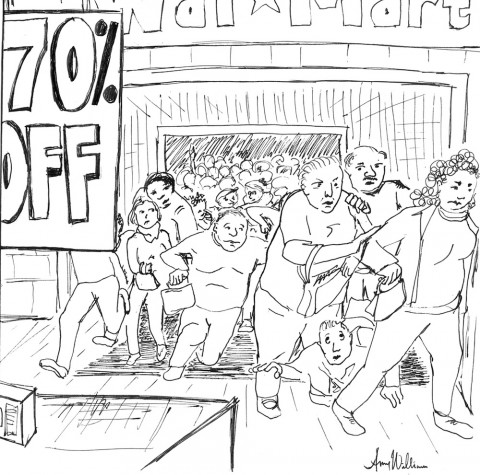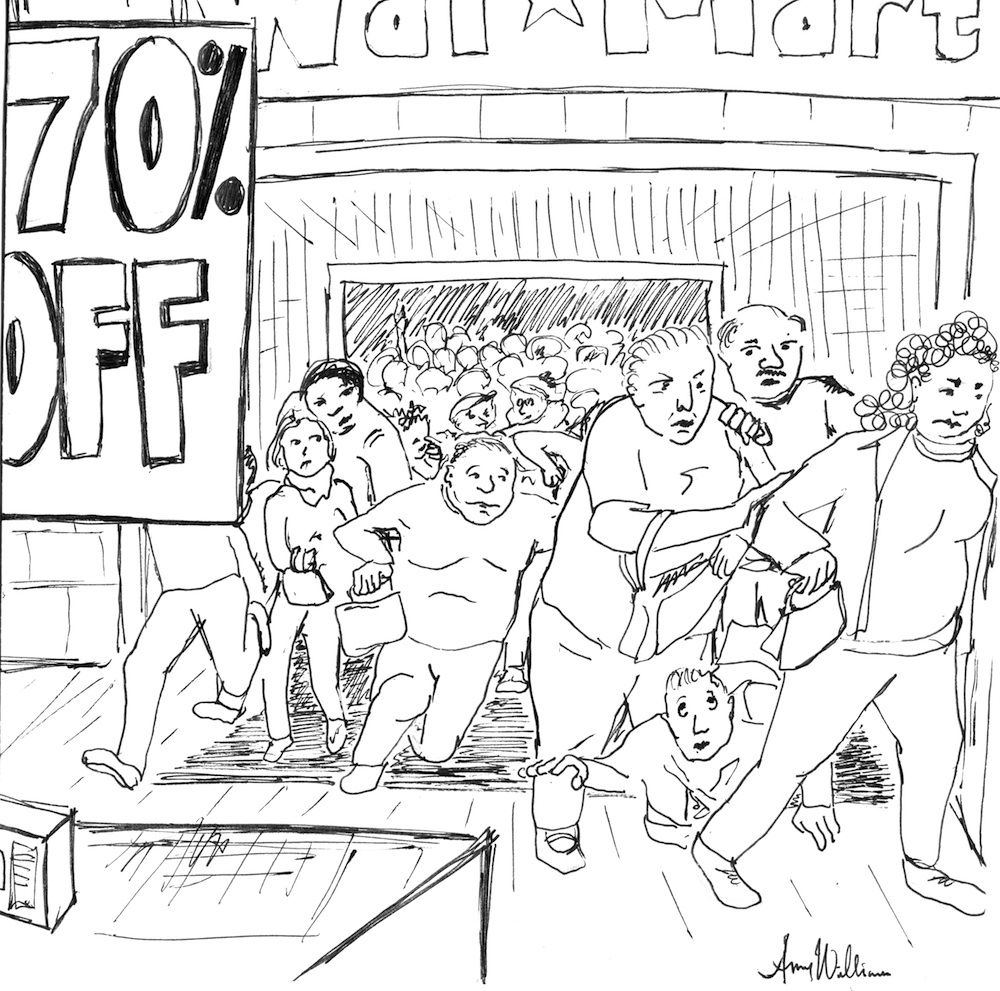
Shoppers crowd into a Walmart to take advantage of Black Friday Sales. Illustration by Amy Williams.
Black Friday scares me. Although I have never actually participated in Black Friday and I never intend to, the name itself implies a dark and dangerous day. I am not averse to shopping and reaping the benefits of holiday sales; I always love a good deal and enjoy time spent browsing through stores. However, I prefer to shop in peace without having to fight my way through hordes of overzealous shoppers or stand in line for hours. For me, part of the fun of shopping is taking the time to browse my options and find something worthwhile. Personal shopping preferences aside, Black Friday disturbs me for other reasons.
The day after Thanksgiving, a holiday in which we are supposedly being thankful and appreciative for how much we already have, is dedicated to consumerism in its most intense form. Black Friday reveals the strength and allure of capitalism and how much of our culture is based on endless consumption. I watched television for about an hour on Wednesday night, which was plenty of time to become thoroughly tired of commercial after commercial featuring eager shoppers getting insanely good deals on clothes and electronics. I am not rejecting all capitalism outright, but when it is continuously forced in my face it starts making me deeply question the moral values of our society.
In addition to constantly spreading messages of greed and consumption, Black Friday seems to be expanding its reach, even overshadowing Thanksgiving itself. In an effort to attract shoppers and boost sales, some stores promoted “Black Thursday Night,” and started their sales at 10 PM on Thursday. In other words, if you are someone who really wants a good deal and would go so far as to line up in advance before the store opens, Black Friday has now seriously impinged on your Thanksgiving. Not everybody does something special for Thanksgiving; but if you do, and if you plan on taking advantage of Black Friday, your schedule is getting a little tight.
One major controversy that arose this year was the reduced Thanksgiving break that some store employees received. Traditionally, stores close for Thanksgiving and employees get to enjoy a day off. This year, Thanksgiving break was cut short for many retail employees in order to accommodate masses of shoppers, who were also cutting short their own holiday. This reduction in personal time for employees strikes me as wholly unnecessary; Thanksgiving is a national holiday and people deserve a full day off, as is the tradition. Instead, Black Friday has reduced the time spent at home or with family for both consumers and retail employees, which could be avoided if stores remained closed for only a few more hours.
Another reason to avoid the Black Friday madness is the annual physical danger involved. Every year there are stories of people getting trampled by the rushing crowd, yet no one ever seems to take this into consideration for the next year. For instance, this year, a woman shopping in the videogame section of a Wal-Mart in Los Angeles pepper-sprayed some twenty people for reasons not entirely clear (either she was protecting herself from what she felt was a dangerous mob, or she wanted a competitive edge). CNN reported that there was Black Friday violence in at least seven states. These violent incidents are troubling; getting assaulted while shopping for holiday gifts certainly does not sound like my idea of a good time.
To be fair, Black Friday is not all bad. Certain stores have extended their sales into the weekend, and while the sales may not be quite as good, they at least offer shoppers a way to indulge in some holiday shopping while avoiding the craziness of Black Friday. I spoke to some friends who went shopping later in the evening who said they were able to avoid the rush, which seems much more reasonable than piling in all at once.
Secondly, if we accept capitalism as our economic system, the logical thing to do is to try to improve it, and Black Friday is a way to boost consumer spending and thus the economy, an effort that generally works. This year’s Black Friday sales were widely considered to be successful for retailers. Consumers can find genuinely excellent deals on merchandise, and it is a chance to acquire something that you cannot justify buying otherwise.
To me, it is not the intent of Black Friday that is disturbing so much as the over-the-top execution of it. What should be a chance to do some fun, early holiday shopping and help out stores can turn into an unnecessarily intense consumerist feeding frenzy. Perhaps the idea of excessive buying, which seems greedy, can one day be transformed into an effort to acquire gifts for others and share in the holiday spirit. •










